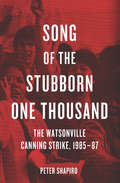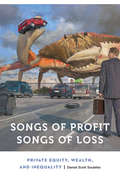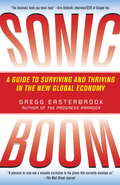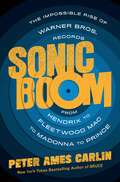- Table View
- List View
Sonder Holdings Inc: Using Technology to Solve Hospitality's Frictions
by John Deighton Leora KornfeldCase
Sonderbetriebsvermögen im Rahmen unternehmerischer Dispositionen über Sachgesamtheiten (Forschungsreihe Rechnungslegung und Steuern)
by Felix WerthebachAusgangspunkt der vorliegenden Untersuchung ist das Entscheidungsproblem des Mitunternehmers, wie mit diesem SBV, das zwar steuerliches Betriebsvermögen der Personengesellschaft darstellt, eigentumsmäßig gleichwohl nur dem Gesellschafter zuzuordnen ist, im Rahmen von betriebswirtschaftlichen Umstrukturierungs- und Übergabevorgängen (Dispositionen über Sachgesamtheiten) zu verfahren ist. Hierzu werden zunächst die Bausteine der Identifizierung von Sonderbetriebsvermögen herausgearbeitet und die steuerlichen Konsequenzen der Bewegung von SBV innerhalb der einzelnen Dispositionsvorgänge (unentgeltlich - entgeltlich – gegen Gewährung oder Minderung von Gesellschaftsrechten) gezogen. Sodann erfolgt die Optimierung jeder einzelnen Fallgruppe anhand eines entwickelten steuerlichen Zielsystems, verbunden mit hieraus abgeleiteten Handlungsempfehlungen für den betrieblichen Entscheider.
Song of the Stubborn One Thousand: The Watsonville Canning Strike, 1985-87
by Peter ShapiroOn September 9, 1985, one thousand mainly Mexican women workers in Watsonville, California, the "frozen food capital of the world," were forced out on strike in response to an attempt by Watsonville Canning owner, Mort Console, to break their union. They returned to work eighteen months later. Not one had crossed the picket line. A moribund union has been revitalized, and Watsonville's Latino majority emerged as a major force in local politics.At a time when organized labor was in headlong retreat, the Watsonville Canning strike was a dramatic show of the power of women workers, whose struggle became a rallying point for the Chicano movement.Apart from its sheer drama, the strikers' story illuminates the challenges facing a group of ordinary working people who waged a protracted and ultimately successful struggle against seemingly insurmountable odds.
Songs of Profit, Songs of Loss: Private Equity, Wealth, and Inequality (Anthropology of Contemporary North America)
by Daniel Scott SoulelesSince the early 1980s, private equity investors have heralded and shepherded massive changes in American capitalism. From outsourcing to excessive debt taking, private equity investment helped normalize once-taboo business strategies while growing into an over $3 trillion industry in control of thousands of companies and millions of workers. Daniel Scott Souleles opens a window into the rarefied world of private equity investing through ethnographic fieldwork on private equity financiers. Songs of Profit, Songs of Loss documents how and why investors buy, manage, and sell the companies that they do; presents the ins and outs of private equity deals, management, and valuation; and explains the historical context that gave rise to private equity and other forms of investor-led capitalism. In addition to providing invaluable ethnographic insight, Songs of Profit, Songs of Loss is also an anthropological study of inequality as Souleles connects the core components of financial capitalism to economic disparities. Souleles uses local ideas of “value” and “time” to frame the ways private equity investors comprehend their work and to show how they justify the prosperity and poverty they create. Throughout, Souleles argues that understanding private equity investors as contrasted with others in society writ large is essential to fully understanding private equity within the larger context of capitalism in the United States.
Songs of the Factory: Pop Music, Culture, and Resistance
by Marek KorczynskiIn Songs of the Factory, Marek Korczynski examines the role that popular music plays in workers' culture on the factory floor. Reporting on his ethnographic fieldwork in a British factory that manufactures window blinds, Korczynski shows how workers make often-grueling assembly-line work tolerable by permeating their workday with pop music on the radio. The first ethnographic study of musical culture in an industrial workplace, Songs of the Factory draws on socio-musicology, cultural studies, and sociology of work, combining theoretical development, methodological innovation, and a vitality that brings the musical culture of the factory workers to life. Music, Korczynski argues, allows workers both to fulfill their social roles in a regimented industrial environment and to express a sense of resistance to this social order. The author highlights the extensive forms of informal collective resistance within this factory, and argues that the musically informed culture played a key role in sustaining these collective acts of resistance. As well as providing a rich picture of the musical culture and associated forms of resistance in the factory, Korczynski also puts forward new theoretical concepts that have currency in other workplaces and in other rationalized spheres of society.
Songy 2011: Restructuring to Survive (Or, Surviving to Restructure?)
by Charles F WuIn 2001, Songy Partners, an Atlanta based real estate developer, was facing three distressed investments within their portfolio each with distinct sets of challenges. Having weathered a myriad of issues during the Global Financial Crisis which included operational shortfalls, failed partnerships, bankruptcies, lender consolidations, lagging tenant demand, low investment liquidity, and pending loan maturities, Songy needed a path forward for these three assets. Songy's lenders were threatening to foreclose on all three properties and also call on personal guarantees. The case addresses Songy's decisions leading up to and during the crisis. Which of the firm's challenges might have been avoidable, did the company have any leverage with its creditors, what tactics might the company employ to save its properties? Within this context, what are Songy's responsibilities to his investors?"In 2011, Songy Partners, an Atlanta based real estate developer, was facing three distressed investments within their portfolio each with distinct sets of challenges. Having weathered a myriad of issues during the Global Financial Crisis which included operational shortfalls, failed partnerships, bankruptcies, lender consolidations, lagging tenant demand, low investment liquidity, and pending loan maturities, Songy needed a path forward for these three assets. Songy's lenders were threatening to foreclose on all three properties and also call on corporate guarantees. The case addresses Songy's decisions leading up to and during the crisis. Which of the firm's challenges might have been avoidable, did the company have any leverage with its creditors, what tactics might the company employ to save its properties? Within this context, what are Songy's responsibilities to his investors?
Songy 2011: Restructuring to Survive (Or, Surviving to Restructure?)
by Charles F WuIn 2011, Songy Partners, an Atlanta-based real estate developer, was facing three distressed investments within their portfolio each with distinct sets of challenges. Having weathered a myriad of issues during the global financial crisis that included operational shortfalls, failed partnerships, bankruptcies, lender consolidations, lagging tenant demand, low investment liquidity, and pending loan maturities, Songy needed a path forward for these three assets. Songy's lenders were threatening to foreclose on all three properties and also call on corporate guarantees. The case addresses Songy's decisions leading up to and during the crisis. Which of the firm's challenges might have been avoidable? Did the company have any leverage with its creditors? What tactics might the company employ to save its properties? Within this context, what are Songy's responsibilities to his investors?
Sonhando com a Rua da Esperança.
by Eder HolguinSonhando com a Rua da Esperança por Eder Holguin De viver nas ruas de Medelim, na Colômbia, para se tornar um empreendedor de sucesso em Nova York De viver nas ruas de Medelim, na Colômbia, para se tornar um empreendedor de sucesso em Nova York Hoje, Eder é um empreendedor de sucesso de Nova York na indústria de mídia on-line e CEO de uma empresa de marketing digital. No entanto, quando criança, em meados dos anos 80, ele fugi de uma vida doméstica assustadora e acabou vivendo por anos nas ruas de Medelim, na Colômbia. Era uma existência arriscada, no que foi descrito nessa época como o "lugar mais perigoso da terra". Onde governantes internacionais de drogas como Pablo Escobar governavam, onde você poderia ser baleado por olhar para o cara errado da maneira errada. Sonhando com a Rua da Esperança é a história de como ele passou de morar nas ruas para se tornar um empreendedor de sucesso. O livro está na tradição clássica da maioridade e prova que, embora a vida possa ser feia e brutal, até os mais desfavorecidos podem superar as probabilidades e encontrar a felicidade, a sua própria Rua da Esperança. A narrativa avança e soa com autenticidade; muitas vezes é triste, chocante, mas, no final das contas, edificante e motivacional.
Sonic Boom: Globalization at Mach Speed
by Gregg EasterbrookThere are signs the recession is about to end. So what comes next? Growth will resume. But economic uncertainty will worsen, making what comes next not just a boom but a nerve-shattering SONIC BOOM. Gregg Easterbrook - who "writes nothing that is not brilliant" (Chicago Tribune) - is a fount of unconventional wisdom, and over time, he is almost always proven right. Throughout 2008 and 2009, as the global economy was contracting and the experts were panicking, Easterbrook worked on a book saying prosperity is about to make its next big leap. Will he be right again? SONIC BOOM: Globalization at Mach Speed presents three basic insights. First, if you don't like globalization, brace yourself, because globalization has barely started. Easterbrook contends the world is about to become far more globally linked. Second, the next wave of global change will be primarily positive: economic prosperity, knowledge and freedom will increase more in the next 50 years than in all of human history to this point. But before you celebrate, Easterbrook further warns that the next phase of global change is going to drive us crazy. Most things will be good for most people - but nothing will seem certain for anyone. Each SONIC BOOM chapter is based on examples of cities around the world - in the United States, Europe, Russia, China, South America - that represent a significant Sonic Boom trend. With a terrific sense of humor, pitch-perfect reporting and clear, elegant prose, Easterbrook explains why economic recovery is on the horizon but why the next phase of global change will also give everyone one hell of a headache. Forbes calls Easterbrook "the best writer on complex topics in the United States" and SONIC BOOM will show you why.
Sonic Boom: The Impossible Rise of Warner Bros. Records, from Hendrix to Fleetwood Mac to Madonna to Prince
by Peter Ames CarlinFrom journalist Peter Ames Carlin—the New York Times bestselling music biographer who chronicled the lives and careers of Paul McCartney, Bruce Springsteen, the Beach Boys, and Paul Simon—Sonic Boom captures the rollicking story of the most successful record label in the history of rock and roll, Warner Bros Records, and the remarkable secret to its meteoric rise.The roster of Warner Brothers Records and its subsidiary labels reads like the roster of the Rock & Roll Hall of Fame: Jimi Hendrix, the Grateful Dead, Joni Mitchell, Neil Young, James Taylor, Fleetwood Mac, the Eagles, Prince, Van Halen, Madonna, Tom Petty, R.E.M., Red Hot Chili Peppers, and dozens of others. But the most compelling figures in the Warner Bros. story are the sagacious Mo Ostin and the unlikely crew of hippies, eccentrics, and enlightened execs who were the first in the music business to read the generational writing on the wall in the mid-1960s. By recruiting outsider artists and allowing them to make the music they wanted, Ostin and his staff transformed an out-of-touch company into the voice of a generation. Along the way, they revolutionized the music industry and, within just a few years, created the most successful record label in the history of the American music industry.How did they do it? It all goes back to the day in 1967 when the newly tapped label president Mo Ostin called his team together to share his grand strategy for the struggling company: “We need to stop trying to make hit records. Let’s just make good records and turn those into hits.”With that, Ostin ushered in a counterintuitive model that matched the counterculture. His offbeat crew reinvented the way business was done, giving their artists free rein while rejecting out-of-date methods of advertising, promotion, and distribution. And even as they set new standards for in-house weirdness, the upstarts’ experiments and innovations paid off, to the tune of hundreds of legendary hit albums.It may sound like a fairy tale, but once upon a time Warner Bros Records conquered the music business by focusing on the music rather than the business. Their story is as raucous as it is inspiring, pure entertainment that also maps a route to that holy grail: love and money.Includes black-and-white photographs
SonoSite: A View Inside
by Clayton M. Christensen Jeremy B. DannAfter its spin-off from one of the world's largest ultrasound makers, Sonosite attempts to popularize a new kind of handheld ultrasound units. Sonosite needs to decide if it should focus on new markets that will value the portability and ease of use of its products, or if it should evolve its offerings so that they appeal to radiologists and cardiologists, the largest purchasers of ultrasound systems.
Sonoco Products Co. (A): Building a World-Class HR Organization
by Boris Groysberg Cate Reavis David A. ThomasDescribes the steps the vice-president of human resources takes in revamping an HR function that was noncooperative and, at times, competitive and introducing the company to the notion of HR as a strategic business partner. Explores changes made to the company's compensation, performance management, and succession planning processes. Teaching Purpose: To allow students to think strategically about reorganizing the human resources department to support business strategy and serve as a business partner.
Sonoco Products Company (A): Building a World-Class HR Organization (Abridged)
by Boris Groysberg David A. ThomasDescribes the steps the vice-president of human resources takes in revamping an HR function that was noncooperative and, at times, competitive and introducing the company to the notion of HR as a strategic business partner. Explores changes made to the company's compensation, performance management, and succession planning processes.
Sons of Mississippi: A Story of Race and its Legacy
by Paul HendricksonThe true story of a racial murder in the South.
Sons of Wichita: How the Koch Brothers Became America's Most Powerful and Private Dynasty
by Daniel SchulmanNot long after the death of his father, whose heart gave out suddenly in November 1967, Charles Koch, then in his early 30s, discovered a letter his father had written when his four sons were small. "My dear boys," it began when you are 21, you will receive what now seems to be a large sum of money. It may either be a blessing or a curse." "Above all," he cautioned, "be kind and generous to one another."In the ensuing decades, Fred's legacy became a blessing and a curse. Two of his sons, Charles and David, joined forces to build Koch Industries, one of the largest private corporations in the world. But they ended up in an epic feud with brothers Bill and Frederick that spanned nearly two decades, tearing the family apart-and nearly Koch Industries along with it. Bill would start his own energy company and attain a modicum of fame as a litigious wine-collector and yachtsman (he likened winning The America's Cup in 1992 to the ecstasy of "10,000 orgasms.") After being marginalized by the patriarch because of his effete manner, Frederick became a patron of the arts and a fastidious refurbisher of historic estates.Starting with their boyhood when fraternal disputes were sometimes settled in the boxing ring, SONS OF WICHITA takes you inside this highly private family and traces the evolution of these four distinct personalities as well as their corporate, philosophical, social and political ambitions (many forget David Koch ran as the Libertarian Party's vp candidate in 1980). Influenced by the conservative, anti-communist sentiments of their father, a founding member of the John Birch Society, Charles and David devised an ambitious strategy to foist their ideological agenda upon the nation-quietly channeling millions of dollars of their fortune into a web of freemarket think tanks, academic programs, advocacy groups, and more, while also building what amounts to a shadow Republican Party, replete with a donor network capable of raising as much in an election cycle as the Republican National Committee. Never before did they flex their political muscles as vigorously as they did during the 2012 campaign, when Charles and David clashed with the Obama administration in what Charles described as the "mother of all wars."Like The Rockefellers before them, The Koch (pronounced like the soft-drink "Coke") Brothers are a great American dynasty. Unlike The Rockefellers, they have never been the subject of a major biography before.
Sony
by Stefan Thomke Akiko Kanno Atsushi OsanaiOn June 15, 2017, Kazuo Hirai, president and CEO of Sony Corporation, stood in front of 1998 shareholders at the company’s 100th general shareholders meeting. For the year ending March 2017, the Japanese company had reported 288.7 billion yen (¥)1 in operating income and a 3.0% return on equity (ROE) (see Exhibit 1). In the following year, Sony expected to achieve 10% or higher in ROE and ¥500 billion or more in operating income, results that the company had not seen in 20 years.
Sony AIBO: The World's First Entertainment Robot
by Youngme MoonThe Sony AIBO is the world's first "entertainment" robot. Positioned as a household "companion," the $1,500 AIBO has become a smash hit in Japan, appealing to both the young and the old, including those with little technical expertise. In the United States, the AIBO is in hot demand among "techies" infatuated with high-tech gadgets; however, it has yet to catch on with the mainstream. The task for Takeshi Yazawa, VP and general manager of Sony Entertainment Robot America, is to figure out how to market the AIBO to the American masses. Includes color exhibits.
Sony Corp.: Car Navigation Systems
by John A. Quelch Yoshinori FujikawaIn the summer of 1996, Masao Morita, president of Sony Personal Mobile Communication Co., contemplated how to formulate its multinational marketing strategy for the fast-changing car navigation systems market. Morita needed to resolve the conflicting views within his company regarding several key issues, including geographical market focus, product selection, and standard setting.
Sony Digital Entertainment, Japan
by Anita ElberseIt is late 2007. So-called cell phone ("keitai") novels have turned into an extremely popular form of entertainment on the go in Japan, in particular among young, female readers. In fact, consisting mostly of love stories written by amateurs in short sentences and containing little plot or character development, cell phone novels republished in book form and even remade as movies have come to dominate mainstream media content. At media giant Sony, Ken Munekata, CEO of Sony Pictures Entertainment (SPE), and Atsushi Fukuda, President of Sony Digital Entertainment (SDE), are attempting to craft an adequate response. After establishing SDE as a 100% subsidiary of Sony Japan, they now develop a wide range of digital content offerings for mobile phone users, mostly original content "made in Japan"-including keitai novels. But can SDE's subscription model compete in a market dominated by free keitai novel offerings? And, more generally, do Sony's current keitai initiatives move the company in the right strategic direction? Allows for an in-depth examination of viable business models for established media companies competing in digital markets dominated by user-generated, advertising-supported content. Also enables an assessment of the economics of producing and distributing traditional films and books versus digital (cell phone) content.
Sony EyeToy
by Youngme Moon Anita ElberseIn early 2004, less than a year after its launch, Sony's EyeToy, a unique video gaming concept, had become a tremendous success across Europe. Developed for use with Sony's PlayStation 2 console, the revolutionary technology allowed users standing in front of a small camera to interact with game objects appearing on a television screen just by moving their bodies. Sales for the first EyeToy product ("Play"), a bundle of the camera and software, exceeded all expectations. However, sales for the second product ("Groove") were disappointing. Was it time for the EyeToy team to rethink its product development and marketing strategy? How could the team sustain EyeToy's initial success and prove that the concept was not a fad?
Sony PlayStation 3: Game Over?
by Elie OfekOutlines the challenges faced by Sony with the launch of its PlayStation 3. Information on the 2006 and 2007 holiday seasons and the success of rival consoles is outlined. In addition, the case allows examining the costs and revenues associated with a business model based on the sale of the hardware and game titles. Can be used with "Home Video Games: Generation Seven" (505-072), which provides supplementary information on the industry.
Sony and the JK Wedding Dance
by John Deighton Leora KornfeldExecutives at Sony Music Entertainment faced a dilemma: a user-generated video featuring controversial artist Chris Brown's music was netting millions of views per week on YouTube. Sony held the copyright to the song, and was entitled to issue a takedown notice to the party that uploaded the video. How should Sony act? This case looks at the issues faced by marketers in an environment in which consumers disseminate content without the assistance, or approval, of gatekeepers.
Sony vs Samsung
by Sea-Jin Chang"Sony vs. Samsung is business history at its best! It explores the divergent fortunes of these two electronics giants in the last decade and identifies the true reasons behind Sony's decline and Samsung's rise. Contrary to popular belief, Chang shows that success (or failure) does not simply arise from different strategies. Rather, it emerges from major decisions that are deeply rooted in the companies' organizational processes and their executives' political behavior. This book is a must-read for any senior executive."--Constantinos Markides, Robert P. Bauman Professor of Strategic Leadership and Chairman, Strategy Department, London Business School"Sea-Jin Chang has produced that rarity in a business book--one that is as valuable to practicing managers as it is insightful to academic researchers. In this fascinating comparison of two modern global giants, he applies his high resolution research microscope to their changing fortunes by dissecting their contrasting strategies, and providing interesting insights into their divergent organizational processes and management practices. This is a very valuable contribution to the international business literature. It will end up in as many corporate boardrooms as faculty seminars."--Christopher A. Bartlett, Thomas D. Casserly Professor Emeritus, Harvard Business School"Sea-Jin Chang has written a fascinating comparison of Sony and Samsung that will be valuable to anyone interested in strategy, organizations or international business. The interwoven and very detailed case studies of two very different companies in overlapping industries illuminate problems such as adaptation to technological change (analog to digital), organizational flexibility and globalization. His attempt to analyze both strategic development and implementation is successful and very useful. Both academics and practitioners will learn a lot from this book."--Stephen J. Kobrin, William Wurster Professor of Multinational Management, The Wharton School, University of Pennsylvania"Refreshingly original and entertaining, this book analyzes major strategic decisions of Samsung and Sony and highlights organizational processes and top management leadership that have shaped their performances. This is a must-read for all executives who want to understand the strengths and weaknesses of Asian competitors. It also provides penetrating insights to other Asian companies with global ambitions."--Myoung Woo Lee, President and CEO, iriver









